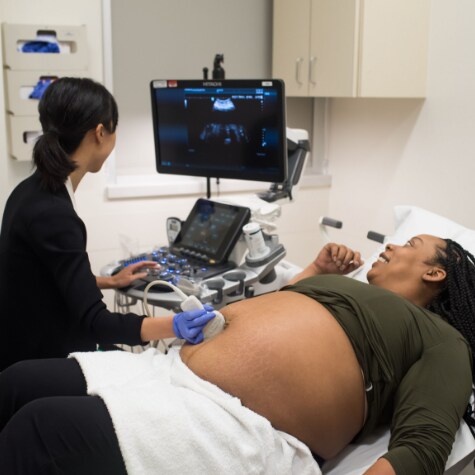Heart Disease Affects Children and Teens, Too
Updated 3/11/24
The number of adults living with heart disease and other heart-related conditions has been widely reported, but few of us realize that heart disease can affect little hearts too—and does so in large numbers.
- In the U.S., it’s estimated that about 40,000 babies are born with a congenital heart disease or defect each year.
- An estimated 3 to 5 million children worldwide are living with chronic rheumatic heart disease, the most serious complication of rheumatic fever.
- More than 4,000 children are diagnosed with Kawasaki disease, the biggest cause of acquired heart disease in children under 5, each year.
While some pediatric heart conditions can't be prevented, there are signs that parents can look for and things parents can do that can lead to earlier intervention and better outcomes for their kids and teens.

What is a pediatric heart condition?
Heart conditions for children are typically divided into two categories: congenital heart disease, or defects that are present at birth, and acquired heart disease that develops as the child gets older.
What is a congenital heart defect?
Congenital heart defects (CHD) occur in about 1 out of every 100 newborns as a result of the heart or blood vessels around the heart not developing correctly. These defects, which can be mild or severe, interfere with the heart's ability to work like it's supposed to.
In the U.S., babies are screened for serious congenital heart defects within 24 hours of being born. However, some congenital heart defects, such as atrial septal defects (holes in the walls of the heart), can remain undiagnosed until a child's teen years or later.
“The detection of heart disease in children has been a top priority of the medical community since the invention of the stethoscope,” says Glen Iannucci, MD, a Pediatric Cardiologist at the Children's Healthcare of Atlanta Heart Center. “In the current era, we have become more sophisticated in our methods of detecting heart disease, including the prenatal detection of congenital heart defects and rhythm abnormalities.”
Although you may hear some physicians use CHD in reference to congenital heart disease, congenital heart defect is the more accurate term. Both phrases refer to the same thing.

Our Fetal Cardiology Program provides specialized care to diagnose fetal heart conditions before a baby is born, consult mothers whose unborn children have suspected or known heart problems, and deliver treatment to help babies born with heart conditions live healthy lives.
learn moreAcquired heart disease
Acquired heart disease is the kind we most often associate with adults, but children and teens can also be affected. The most common acquired heart diseases in children are rheumatic heart disease and Kawasaki disease.
What is rheumatic heart disease?
Rheumatic heart disease is the most serious complication of rheumatic fever, an illness caused by the bacteria responsible for strep throat. Your child's immune system can produce antibodies to fight the strep infection, but in some cases, these antibodies can damage heart valves, leading to rheumatic heart disease. Noncardiac symptoms include joint pain and swelling; rash on the trunk or arms; skin bumps on the wrist, elbows or knees; and rapid limb movements. Fortunately, because of the availability of medications to fight strep, rheumatic heart disease is fairly rare in the U.S.
What is Kawasaki disease?
Kawasaki disease causes the body's own immune system to attack healthy tissues, leading to inflammation in the coronary arteries and heart muscles. It's the leading cause of acquired heart disease in children in the U.S. Kawasaki disease is most commonly seen in Asian children or children of Pacific Island descent, and it tends to affect more boys than girls. About 80 percent of children diagnosed are under 5 years old.
Noncardiac symptoms of Kawasaki disease include a fever lasting five or more days, a rash, red or bloodshot eyes, swollen or cracked lips, a red “strawberry” tongue, swollen hands and feet, and swollen lymph nodes.
Additionally, many parents are surprised to learn that children can develop high blood pressure and high cholesterol, potential precursors to serious problems like a heart attack or stroke.

Questions to ask during a fetal echocardiogram
A fetal echocardiogram is an imaging test that allows a doctor to observe the structure of an unborn baby’s heart for any potential heart conditions. Learn what to ask the doctor about your baby's heart during this test.
read moreOther Signs of Heart Problems in Children
Signs of heart problems in children vary based on the condition, a child's age and whether the heart condition or disease was acquired before a child was born or during childhood.
Heart problems in babies
Signs of potential heart problems in infants may include:
- Trouble gaining weight
- Bluish color to the lips, tongue or nail beds
- Difficulty with feeding
- Fast or rapid breathing, or difficulty breathing, even while resting
- Tiring easily while eating
- Sweating while feeding
Call your doctor right away if you notice your baby displaying any of these signs or symptoms.
Heart problems in young children
In young children, look for:
- Passing out during physical exercise or activity
- Heart palpitations—a heartbeat that feels funny or fluttery to a child
- Shortness of breath while playing or being active
- Chest pain
Heart problems in teens
Signs of heart disease in teens are similar to those in younger kids. Usually, teens who are active in sports will have already undergone a physical exam with their pediatrician that included questions to try and help capture potential heart problems early. However, if your teen athlete complains of chest pain or any other heart symptoms during activity, consider scheduling a screening and evaluation by a pediatric cardiologist.
Signs of heart problems you may have missed
Regardless of age, persistent breathing difficulty is an often-overlooked sign of a potential pediatric heart condition. This is because most people associate breathing problems with respiratory issues rather than something heart related. If your child is having consistent trouble breathing or has been diagnosed with a respiratory condition that's not responding to treatment, a consultation and screening with a pediatric cardiologist could be a beneficial next step.
If you suspect your child may have an underlying heart condition, discuss this openly with your child's pediatrician. Have the pediatrician assess your child to help determine what your next move should be. This could include screening tests, a few lifestyle changes or referral to a pediatric cardiologist.
“The goal has shifted from not just the identification of the problem, but to optimizing the health of a child from the beginning so that they can lead as healthy and active a life as possible,” says Dr. Iannucci.
Important factors when choosing a pediatric cardiologist
Here are some other things to consider when choosing the best pediatric cardiologist for your child.
- Recommendations from someone you trust: Ask other healthcare providers or your child’s pediatrician for their recommendation.
- Locations: Look for a pediatric cardiologist close to your home and your child’s pediatrician. Children’s Cardiology offers more than 20 pediatric cardiology locations throughout the state.
- Experience: You should be confident in the heart care your child receives. Children’s Cardiology brings together a team with extensive experience in treating heart conditions in infants, children and teens, from simple to complex.
- Access to other specialists: The Children’s team provides easy access to an entire team that includes regional and national experts in more complicated heart conditions.
- National reputation in cardiac care: When you bring your child to the pediatric heart specialists at Children’s, you can rest assured knowing that they will be cared for by one of the country’s leading pediatric cardiology and heart surgery teams.
If your child is in their late teens and is experiencing chest pain or other symptoms, it is best to consult with a pediatric cardiologist. The most-likely cause can be very different in an active, growing adolescent than what may be seen in a middle-aged individual typically seen by an adult cardiologist, and evaluation by a pediatric cardiologist may avoid unnecessary testing with additional expense and worry while awaiting the results. Additionally, pediatric cardiologists have spent time formally evaluating adolescents. “When I ask my teenage son how school was, I don’t let him get away with the one-word answer of ‘good’. Similarly, when we are evaluating patients, we really seek to engage the patient to understand their symptoms and evaluate for other associated signs.” Said Dr. Iannucci. “Most of us in pediatrics went into this field know this was a part of the challenge and joy of our profession”, he added.
Questions to ask a pediatric cardiologist
It can be overwhelming to learn that your child has a heart condition, but these questions can help guide the conversation with your child's cardiologist:
- How will this diagnosis affect my child and his ability to run, play and be a kid?
- What course of treatment do you recommend for this diagnosis?
- Are there any risks with this type of treatment?
- What can I do as a parent to help slow the progression of the condition?
Despite how scary it may seem to have a child with a heart problem, advances in modern medicine have greatly improved outcomes for pediatric heart disease, and most kids with heart conditions grow up healthy and are able to thrive.
Learn About Common Heart Conditions in Kids
Contact Us 404-785-KIDS (5437)


